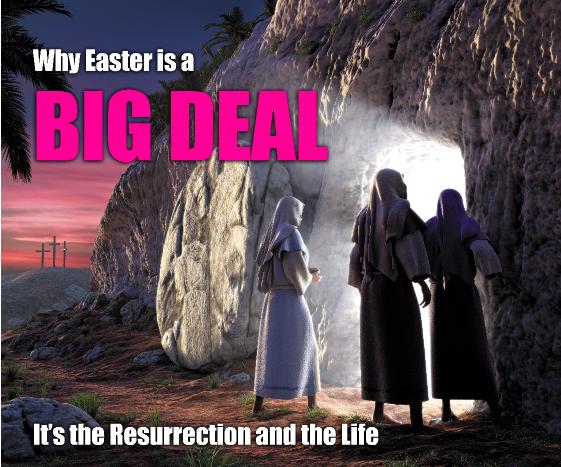 |
|
HOME | PROCLAMATION! MAGAZINE | BLOG SITE | DEVOTIONALS | STUDIES | LETTERS | ABOUT US | RELATED WEBSITES |
|
HOME / PROCLAMATION! MAGAZINE / 2011 / JANUARY FEBRUARY MARCH / WHY EASTER IS A BIG DEAL
CHRIS LEE
 I woke up early that morning, my footie pajamas sinking into the shag carpet as I bailed out of bed and began methodically searching every spot in the house where a basket laden with goodies might be hidden. Finally, there it was—cleverly concealed inside the dryer. It was stuffed full of malted chocolate eggs in foil, brightly colored jellybeans, and one large chocolate bunny. Later we dyed hard-boiled eggs and then searched for them in our back yard after Mom hid them.
I woke up early that morning, my footie pajamas sinking into the shag carpet as I bailed out of bed and began methodically searching every spot in the house where a basket laden with goodies might be hidden. Finally, there it was—cleverly concealed inside the dryer. It was stuffed full of malted chocolate eggs in foil, brightly colored jellybeans, and one large chocolate bunny. Later we dyed hard-boiled eggs and then searched for them in our back yard after Mom hid them.
The hunt for candy and colored eggs was Easter to me as a child. The only other thing I knew about Easter was that I wasn't supposed to talk about it at church or with the other kids in our Seventh-day Adventist church school. My mother, who didn't grow up Adventist, shared with her kids some of the Easter traditions she had enjoyed as a child, but she preferred her fellow Adventists not know these secrets. I remember asking why we couldn't talk about Easter and was told that most of our friends didn't celebrate it because it was a pagan holiday. I asked why our family celebrated Easter if it was pagan. My mom told me that she thought it was alright to have some fun with bunnies, eggs, and jellybeans as long as we realized that the Easter Bunny was make-believe, and we were just playing a game, kind of like we did at Christmas when we would pretend that Santa Claus was coming. I recall no mention of Jesus or His resurrection.
As the years went by, it became more acceptable to engage in some of the "secular" activities surrounding Easter. More and more of my friends reported getting candy or participating in neighborhood egg hunts or similar celebrations. However, throughout my childhood and teen years, I never heard the holiday acknowledged in church. As a college student attending a couple of the more progressive Adventist college churches, I began to hear an occasional mention of Easter from the pulpit, usually as a passing reference to what others in the community would be doing that weekend. Often the reference was used to highlight the fact that we instead chose to honor Christ by honoring the Sabbath, just as He did by resting in the grave on the seventh day. Sometimes mention of the resurrection might be thrown into a sermon somewhere as well, but I don't remember ever hearing about it without it being linked back to the seventh-day Sabbath in some convoluted way.
Was my experience typical? Based on conversations over time with a large number of former and current Adventist contacts across the country, I believe that my experience is common to many Adventists and certainly cannot be classified as unique. I'm sure some Adventists would say that I'm dead wrong, that my experience was not really representative of Adventism. To be sure, I grew up in the Midwest where historic Adventist practices are more prominent than on the coasts. I have no doubt that there are Adventist families who have always openly engaged in Easter egg hunts. I have even heard of one Adventist church in Southern California and one in Minnesota that went so far as to hold Easter Sunday services as evangelistic outreaches to their communities. Of course, the object was to get people to come back the next Sabbath. Moreover, in the case of the Minnesota congregation, there was a significant backlash from Adventist leadership for resorting to such unorthodox technique.
Nevertheless, despite the few examples that could be cited of some Adventists "celebrating" Easter, the bottom line is that a person would have a very difficult time finding an Adventist church with its doors open on Easter morning, nor would one find many families gathering together to engage in a deeply spiritual celebration of the risen Lord. If the day is acknowledged at all, it is usually in a primarily secular way. At best, Easter is considered a minor holiday. Case in point, the Adventist college in the city where I live routinely schedules its alumni reunion weekend to coincide with Easter weekend. Various events are scheduled Thursday through Saturday night with Sunday being the day most travel back home. On a holiday when Christians all over the globe are gathering to celebrate the resurrection of Jesus through corporate worship followed by big feasts with extended family, graduates of Union College are mostly in their cars or on planes giving no thought to corporate worship or Easter dinner. Easter is just not a very big deal in Adventism.
Why don't Adventists celebrate Easter?
I am often asked why Adventists don't typically celebrate Easter. My mother's response about pagan underpinnings doesn't fully answer the question. There does appear to be a certain amount of truth to the Adventist claim that some of the traditions associated with Easter, such as the time of year, certain symbols, and possibly even the name have roots in pagan celebrations. However, something similar could be said of Christmas which is now embraced by nearly all modern Adventists (even though that was not the case with early Adventists). If you ask modern Adventists why it is okay to celebrate Christmas, I think they would correctly say that regardless of some distant link to a pagan celebration or symbols, what Christians celebrate today is the birth of Jesus, so the symbols are given their meaning in this biblical context. It doesn't much matter where the date came from or why Christmas trees are used if Jesus and His birth are now the objects of the day and the symbols. Simply put, in most modern Adventists' experiences, Christianity has triumphed over paganism where Christmas is concerned. So why isn't the same type of logic applied to Easter? I believe the full answer is complex and deeply rooted in core Adventist theology.
Adventist theology tends to under-emphasize, or even negate, the significance of the resurrection. I recall working with an Adventist friend whom we'll call "Doug". I had put an album by a Christian group on the CD player, prompting Doug to ask who the artists were.
When I answered, "Third Day", he responded with, "What's that supposed to mean?" I explained that the group's name was a reference to Jesus rising on the "third day" just as He promised. I thought that would be explanation enough, but Doug immediately came back with, "Why would you want to name your group that?"
I was a bit stunned and stammered something about the resurrection of Jesus being a central event in Christian belief. This prompted Doug to query, "Why? Wouldn't we still be just as saved without it?"
Doug's question was a very good one, one for which I didn't immediately have a reply. This drove me to the Scriptures to find an answer for Doug and myself. This study helped me begin to understand the stark differences in the message of Adventism versus the message of the apostles. So before diving into SDA theology, let's first take a brief survey of just a little bit of what the Bible has to say about the importance of the resurrection of Christ and how it is directly linked to our assurance of salvation. Jesus Himself makes it clear that our hope of resurrection and life is in Him because He Himself is the resurrection and the life. No resurrected Jesus, no eternal life.
Jesus said to her, "I am the resurrection and the life; he who believes in Me will live even if he dies, and everyone who lives and believes in Me will never die. Do you believe this?" (Jn. 11:25-26).
As the fledgling church was being formed, the apostles saw the resurrection as so central to their message that a replacement for Judas was required to be an eyewitness to the resurrected Lord.
"Therefore it is necessary that of the men who have accompanied us all the time that the Lord Jesus went in and out among us—beginning with the baptism of John until the day that He was taken up from us—one of these must become a witness with us of His resurrection" (Acts 1:21-22).
The rest of the book of Acts is replete with repeated testimonies to the fact that Jesus had risen from the grave. It was a constant and central part of the gospel message that transformed the Roman world. The same message is repeated throughout the epistles. In Romans, the apostle Paul makes it clear that we are united with Christ in both His death and His resurrection. It is through our identity in the resurrected Christ that we have our assurance of salvation and eternal life.
Or do you not know that all of us who have been baptized into Christ Jesus have been baptized into His death? Therefore we have been buried with Him through baptism into death, so that as Christ was raised from the dead through the glory of the Father, so we too might walk in newness of life. For if we have become united with Him in the likeness of His death, certainly we shall also be in the likeness of His resurrection (Rom. 6:3-5).
The resurrection event is so important that it is part of a saving confession of faith. Some liberal groups which assume the label "Christian" deny a literal resurrection. There is no salvation in such a false belief system. In his letter to the Roman church, Paul makes it clear that belief in a resurrected Lord defines true saving faith.
If you confess with your mouth Jesus as Lord, and believe in your heart that God raised Him from the dead, you will be saved; for with the heart a person believes, resulting in righteousness, and with the mouth he confesses, resulting in salvation (Rom. 10:9-10).
In 1 Corinthians 15, Paul includes the third-day resurrection as an essential part of the gospel which saves us and as a matter of first importance.
Now I make known to you, brethren, the gospel which I preached to you, which also you received, in which also you stand, by which also you are saved, if you hold fast the word which I preached to you, unless you believed in vain. For I delivered to you as of first importance what I also received, that Christ died for our sins according to the Scriptures, and that He was buried, and that He was raised on the third day according to the Scriptures (1 Cor. 15:1-4).
Throughout the rest of the chapter Paul goes on to describe in great depth the importance of the resurrection and the reality that without the resurrection we are still dead in our sins and have no hope. Especially notable is verse 22 which states that death came through Adam, but resurrection and life are in Christ.
But now Christ has been raised from the dead, the first fruits of those who are asleep. For since by a man came death, by a man also came the resurrection of the dead. For as in Adam all die, so also in Christ all will be made alive (1 Cor. 15:20-22).
In Philippians we are told that there is power in the resurrection of Christ, and we again see that our identity and hope are in both Christ's death and His resurrection.
...that I may know Him and the power of His resurrection and the fellowship of His sufferings, being conformed to His death; in order that I may attain to the resurrection from the dead (Phil. 3:10-11).
The Apostle Paul is certainly not alone in proclaiming the resurrection as being directly tied to our sure hope. Peter preaches a very similar message and even emphasizes the connection between the saving new birth, which all the saved experience, and Jesus' resurrection.
Blessed be the God and Father of our Lord Jesus Christ, who according to His great mercy has caused us to be born again to a living hope through the resurrection of Jesus Christ from the dead (1 Pet. 1:3).
At this point I feel I need to pause and acknowledge the fact that many Adventists will strenuously object to the suggestion that the Adventist belief system is weak on resurrection theology. They will no doubt vigorously state that they agree with all the points above and insist that my friend Doug is an aberration who is not representative of well-educated Adventists. Certainly it's true that Adventism does teach a literal resurrection and that the points above are not necessarily directly contrary to Adventist teaching. However, the question at hand is not one of whether or not the resurrection is believed to be true—it is—but a question of why this event is not emphasized and celebrated by Adventists to the same degree it was by the apostles and is by nearly all believers who have come after them. If Adventism truly saw the resurrection as the defining event in Christianity, then Adventists would celebrate and preach that event to the same degree evangelical Christians do. This is precisely where the weakness of Adventist resurrection theology is exposed. While the resurrection is what defined the message of the Apostles and still defines evangelical Christianity, it is not what defines the message of Adventism.
In researching the theology of Seventh-day Adventism, it is important to consult primary, authoritative Adventist sources. The official Seventh-day Adventist Church website, as well as numerous other published Adventist sources, list the 28 Fundamental Beliefs of Adventism. To refer to these beliefs as "fundamental" is to say that they support the existence of, determine the essential structure of, and are of central importance to the organization's belief system (Merriam-Webster Dictionary). In other words, without any one of these fundamentals, the belief system would represent something other than Seventh-day Adventism.
Adventist Fundamental Belief #13 deals with the remnant church and its mission of proclaiming what is referred to as "The Three Angels' Messages". In order to understand fully these unique Adventist messages we must also turn to another Fundamental Belief. Adventist Fundamental Belief #18 teaches that the writings of Ellen G. White are considered by the organization to be a prophetic, inspired, "…a continuing and authoritative source of truth…". There is no more authoritative source to which we can go for the Adventist understanding of the Three Angels' Messages. Ellen White has much to say on this topic. Her "authoritative" views will be synthesized and summarized here, but for those wishing to more deeply research White's teachings on this topic, the Testimonies for the Church, volumes 6-8 as well as The Great Controversy are primary references.
Adventism sees itself as a movement comprising the remnant people of God who have been called in the last days to proclaim the Three Angels' Messages of Revelation 14:6-12. The first angel proclaims the everlasting gospel which, according to Adventist belief, includes the concept of a heavenly investigative judgment which supposedly began in 1844. The second angel's message is a call to depart "Babylon" which is interpreted as Roman Catholicism and all the Protestant churches (the daughters of Babylon) which have been influenced by Catholicism. The influence of Roman Catholicism within Protestantism is believed to be demonstrated primarily by the fact that most Protestant churches meet for worship on Sunday. This brings us to the third angel's message which is believed to be a warning against worshiping on Sunday. Adventists teach that those who worship on the seventh-day Sabbath (Saturday) will receive the seal of God while those who worship on Sunday will eventually receive the mark of the beast and be lost.
The first angel
Let us more closely examine each part of the Adventist message beginning with the first angel. The first angel carries the idea of a "gospel" defined by an investigative judgment. In Adventist belief Jesus is pictured as returning to heaven after His resurrection to minister as a priest in a sanctuary building with two compartments. Jesus is believed to have initially returned to the lesser compartment and did not enter the most holy place until the year 1844 A.D. The resurrection was not the culmination of a finished work, but merely the event that prepared the way for a new phase of work referred to in Adventist literature as "the investigative judgment", "pre-advent judgment", "sanctuary ministry", or other related titles. We will use the most oft-used term, "investigative judgment" (IJ). Because this is the founding doctrine of the Seventh-day Adventist movement, it is necessary to understand something of this essential belief in order to understand how it informs Adventist theology, including the theology of the resurrection.
In researching the doctrine that gave birth to Adventism, we must again consult primary, authoritative Adventist sources. Fundamental Belief #24 sets forth the investigative judgment (IJ) doctrine as one of the 28 beliefs which are essential to Adventism. In order to better understand the details of this doctrine, we will turn to that authoritative source of Adventist truth, Ellen White (Fundamental #18). One of White's most revered and oft-quoted books is The Great Controversy, and it is the chapter entitled "The Investigative Judgment" (in older editions) or "Facing Life's Record" (in newer editions) that most thoroughly outlines the authoritative teaching on the IJ. If we examine this chapter by asking the journalistic "five W's and an H", we learn the following about the Adventist understanding of Jesus' supposed work in the investigative judgment:
- Q: When is the IJ?
- A: It began in 1844 and is going on today (p. 480).
- Q: Where does the IJ take place?
- A: In heaven in "the holy of holies" (p. 480).
- Q: Why is an IJ needed?
- A #1: To make an atonement [apparently the atonement was not completed at the cross] (p. 480).
- A #2: To determine who is entitled to the benefits of atonement (p. 480).
- Q: Who is judged?
- A: Believers only, not unbelievers (p. 480).
- Q: What is judged?
- A: Every believer's work down to the smallest detail, even wasted moments (p. 482).
- Q: How are people judged?
- A: According to how well believers' characters and lives meet the standard of the Law (p. 482).
- Q: Why are works judged?
- A #1: To determine which believers are accounted worthy of eternal life (p. 482).
- A #2: To reject believers who have any unconfessed sins still on the books, to blot those believers out of the book of life, and to erase any good deeds those believers had (p. 483).
- A #3: To determine the weight of each work, good or bad, in deciding the believer's destiny for weal or woe, counting against the believer even a completely forgotten sin which he had not specifically confessed (p. 486, 487).
- Q: What should believers do, given that they are on probation, under judgment, and the weight of their works will decide their destiny?
- A: Afflict their souls before God (p. 490).
The investigative judgment is not the gospel. It's not good news. Rather, it's an anti-gospel. If a person embraces this doctrine, there is no way one can know if one is saved or not until such time as Jesus comes to his or her name in this supposed judgment and judges his works to see if he or she is entitled and worthy. In this anti-gospel, Jesus' resurrection is the culmination of nothing, settles nothing, and assures us of nothing. Why celebrate an event of so little import?
The second and third angels
We will now turn our attention to the second message that is believed to define the remnant people of God. The second angel is thought to call Christians out of "Sunday-keeping" churches, referred to as "Babylon". Given the importance of this message, it can easily be seen why much of Adventist evangelism is focused on proselytizing Christians and converting them to Adventism by means of "Revelation Seminars" held all around the country under various names. The key "truth" used for proselytizing Christians is the seventh-day Sabbath.
Adventists believe the third angel's message is closely related to the second. The third angel warns that those who worship on Sunday will one day receive the mark of the beast. This fact explains why it would be very difficult theologically for Adventists to celebrate Easter. Imagine running countless "Revelation Seminar" evangelism series teaching that worshiping on Sunday is the mark of the beast, then showing up on Resurrection Sunday to worship!
In essence, the defining message of Adventism is that the eternal destiny of Christians is determined on the basis of their day of worship. They will be "sealed" or "marked" based on whether they worship on Saturday or Sunday. Given this theological stance, Adventists are forced to de-emphasize a resurrection that occurred on a Sunday that settled nothing. Rather than celebrating the day Jesus rose from the grave as He promised, Adventists instead assert that He only stayed in the grave until Sunday in order to honor the Sabbath and to provide an example for us by resting on Saturday. This clearly moves the basis of salvation away from trusting in the righteousness that is in Christ alone, to trusting the perceived, personal righteousness of worshiping on the perceived right day—a subtle, but blatant perversion of the gospel. Not only this, but according to Ellen White (Spirit of Prophecy vol. 3, p. 203-204), not only did Jesus rest on the Sabbath, but everything that Jesus was stayed in the tomb in an unconscious state, including His deity!
The Adventist Jesus
These Adventist beliefs raise another issue in Adventist theology. The Jesus of Adventism is different in notable ways from the Jesus of Christianity. The Jesus Ellen White describes is not consistent with the God who keeps Israel who will neither slumber nor sleep (Ps. 121:4) and in whom all things hold together (Col. 1:17). Adventists do not believe the spirit is anything more than breath which is exhaled at death, so they are forced to say that Jesus was unconscious, essentially non-existent, in both His humanity and His deity, while in the tomb. In Adventism, Jesus is not the complete fulfillment of all the old covenant shadows, but is instead Himself subject to the shadow of the Sabbath. The Jesus of Adventism is not primarily our substitute, but is instead primarily our example. According to Adventist interpretation, in the many "Sabbath conflicts" with the Pharisees in the Gospels, Jesus is not declaring Himself to be greater than the shadow of the Sabbath, but is instead attempting to reform corruptions in Sabbath-keeping and to provide an example to us of how best to keep the Sabbath. In Adventist belief, the resurrected Jesus did not return to the place of greatest honor, glory, and holiness, nor was His work finished. The bottom line is that the Jesus of Adventism is not the Resurrection and the Life, but the judge who examines our works to see who is accounted worthy of eternal life.
Because of these beliefs, Adventists do not tend to see their identity and destiny as being firmly and permanently established in Jesus' vicarious life, death, and resurrection. Many Adventists who truly understand and embrace their belief system and the authoritative teachings of Ellen White, believe that Jesus had no advantage over us, was born with a sin nature, and could have failed in His mission by falling into sin. They see Jesus' life as an example proving that perfection of character is attainable through personal effort and the assistance of God. Adventists see Jesus' death as an incomplete atonement that has purchased a period of probation after which they will have to stand before a holy God, without a mediator, with a purified character attained by grace plus "their own diligent effort" (Great Controversy p. 425). Adventists see eventual eternal life as something for which they wish, attainable only if they can pass the investigative judgment and be found to be entitled to the benefits of atonement. There can be no real certainty about one's destiny, so there is very little to celebrate in the resurrection of Jesus. It bears repeating that in Adventist theology Jesus' resurrection settled nothing, except perhaps to demonstrate that such an achievement is theoretically possible.
The biblical Jesus
Oh, how different is the biblical Jesus and the biblical gospel!
1 Peter 3 pictures the resurrected Jesus Christ "at the right hand of God, having gone into heaven, after angels and authorities and powers had been subjected to Him." Hebrews chapters 1, 10, and 12 expand this "right hand" imagery to picture Jesus as having "sat down" upon His ascension to heaven. All this imagery describes Jesus rising to return to the place of greatest power, honor, glory and holiness, His work finished and complete once for all. In biblical theology, the resurrection is the culmination of Jesus' substitutionary work on our behalf. Jesus lived in perfect holiness and credited His incomparable righteousness to our account as if it were our own. Jesus took our sins upon Himself and bore the righteous wrath of God against our sin in His person, completely paying the penalty of our sin as a propitiation. Jesus then rose from the dead, returning to heaven so that those who are in Him are even now raised up with Him, seated with Him in heavenly places (Eph. 2:6) assuring our place with Him eternally. Jesus is able to save us forever because He always lives as our intercessor (Heb. 7:25). It is the resurrection that testifies to and authenticates Christ's complete work (Rom. 4:25). It is in the resurrection that we have our assurance and sure hope. The resurrection was at the very core of the gospel message because it witnessed to Jesus' work being real, effective, complete, and worthy of all faith.
Since leaving Adventism I have endeavored to be conformed to a biblical worldview. The more time I spend in the Word, the more I am impressed with how central the resurrection is to the gospel. Without the resurrection there is no good news. It is an event worth celebrating! With this conviction I have found that Easter has become a spiritual high point for my family and me. It is a time we greatly anticipate. We eagerly look forward to the joyous and exuberant worship we will share with our brothers and sisters in Christ. We look forward to the family feast we will share together in celebration of the One who has granted us access to the King's table. Jesus has become the focal point of the celebration while bunnies, eggs, and jellybeans have faded away into insignificance. It matters not at all what dates or traditions may have been celebrated in the distant past. We celebrate our Risen Lord and our place in Him. The focus of our worship gives Easter its significance.
As meaningful as Easter has become for me, the heart of Easter is a celebration that lasts the whole year through. Each day becomes a celebration of the living Lord Jesus and who I am in Him. I am even now seated with Him in heavenly places, and that is all the assurance and significance I will ever require in life. Each weekly "Third Day" has become a corporate celebration of the risen Lord who has adopted us into the family of God and made us brothers and sisters in Christ. That's all the identity I will ever require, and it will be my identity throughout eternity. That's worth celebrating, today, everyday, and in a special way on the day that has come to represent the reason our hope is founded and sure. It is my sincere hope that this Easter Sunday, you will join your brothers and sisters in Christ in a joyful corporate celebration of the culmination of Jesus' victory over the power of sin, death, and the grave.
It really is good news! It really is a big deal! Jesus is the resurrection and the life. †
![]()
Copyright 2011 Life Assurance Ministries, Inc., Casa Grande, Arizona, USA. All rights reserved. Revised April 4, 2011. Contact email: proclamation@gmail.com

Blessed be the God and Father of our Lord Jesus Christ, who according to His great mercy has caused us to be born again to a living hope through the resurrection of Jesus Christ from the dead.

...the heart of Easter is a celebration that lasts the whole year through. Each day becomes a celebration of the living Lord Jesus and who I am in Him.

 Chris Lee lives in Lincoln, Nebraska with his wife, Carmen, and daughters, Ashlyn and Alyssa. The family attends Lincoln Berean Church where Chris is a LifeGroup leader and serves as a resource on Adventism. He regularly works with questioning and transitioning Adventists as well as concerned evangelicals. Chris can be reached by e-mail at ambulater@gmail.com.
Chris Lee lives in Lincoln, Nebraska with his wife, Carmen, and daughters, Ashlyn and Alyssa. The family attends Lincoln Berean Church where Chris is a LifeGroup leader and serves as a resource on Adventism. He regularly works with questioning and transitioning Adventists as well as concerned evangelicals. Chris can be reached by e-mail at ambulater@gmail.com.